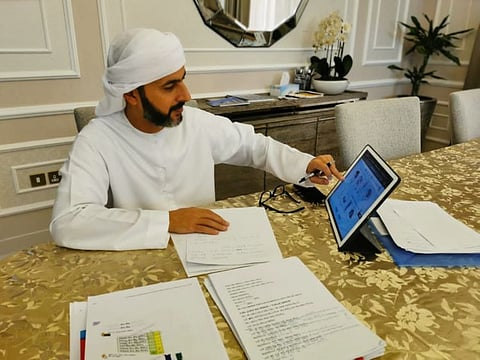Watch: Emirati man takes baby steps in Hebrew as UAE-Israel ties go sky-high
Many Emiratis embrace Hebrew on social media to enjoy new camaraderie with Israelis

Abu Dhabi: As the UAE-Israel ties have gone sky-high with peace treaties and bilateral agreements, Emiratis are embracing Hebrew to enjoy the new camaraderie with Israelis.
While several Emiratis have started adding their names and conveying greetings in Hebrew on social media platforms, some like Yousif Ghanoum Al Hameli have gone the extra mile in taking Hebrew lessons from a tutor. “I was excited to learn Hebrew from the time I heard about the normalisation of ties with Israel,” the UAE national from Abu Dhabi told Gulf News.
“It is a beautiful language. The fact that it is one of the ancient languages in the world itself is interesting. Both Arabic and Hebrew are Semitic languages. They have the same base. They come from one root. There are some similarities.”
Though he initially tried to learn Hebrew by himself, Al Hameli soon realised that it is not an easy task as he had expected. “When I first heard there are only 22 letters in Hebrew alphabet [as against 28 in Arabic], I felt that is a good discount. But I was wrong.”
He said he realised that learning the correct positioning of the diacritical marks for vowels made a lot of difference in the words’ meanings like in Arabic.
Tricky challenge
“You can have the same letters, but the way you use the symbols [diacritics] will change the meaning. You might write one word in different ways and get different meanings. This is the challenge. You have to practice and be familiar with the words and how they are pronounced. When you first learn Hebrew they put the vowel symbols in the letters for beginners. At a later stage, you won’t be able to see those characters, for example, in the newspapers and magazines. So, you have to study not only the words, you have to watch TV and movies also although you don’t understand what they are saying.”
Al Hameli said this style of writing the vowel sounds with diacritics only in primary classes or for beginners is followed in Arabic as well. “When you grow up, they disappear. You don’t use them anymore but you are already familiar with the usage.”
To take his baby steps in Hebrew, Al Hameli then sought the help of a tutor. The Egyptian tutor, who had worked as a tourist guide for Israelis visiting his country, has started taking classes on four days a week for Al Hameli. “It’s week four now. I have learnt the basic stuff but it is still not good enough. I am struggling to write sentences,” said Al Hameli.
No matter what the difficulty level is, Al Hameli is committed to learn Hebrew at the earliest. The 48-year-old senior executive is dedicating time for his Hebrew lessons early in the morning and later after work every day. “I am using some websites and printed materials to learn the language. I find it funny as I am learning basic words like a kindergarten student. But I feel young when I do it. I am also lucky that I found a tutor. I want to learn Hebrew quickly. There are young Emiratis who speak Hebrew very fluently. They have learned it from outside, mainly from the US. I hope I can start speaking like them soon,” said Al Hameli, who knows only Arabic and English.
“I am eagerly waiting to go to Israel once the COVID-19 pandemic is over. I am sure I will go there frequently. I hope the language will help break some barriers to start exploring new things there.” Al Hameli hoped that there would be new avenues to learn Hebrew in the UAE as many Emiratis are looking forward to visiting Israel.
Sign up for the Daily Briefing
Get the latest news and updates straight to your inbox






